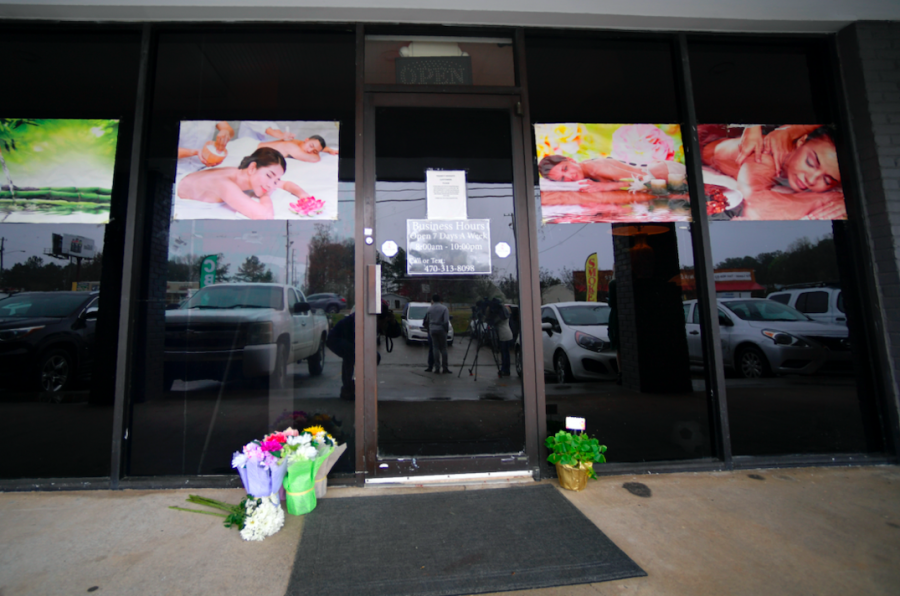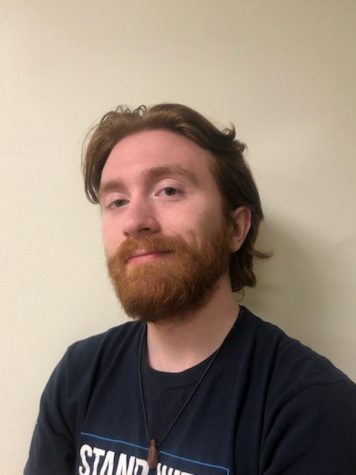Atlanta shooting yet another confrontation with America’s race problem
A make-shift memorial is seen outside a business where a multiple fatal shooting occurred on Tuesday, Wednesday, March 17, 2021, in Acworth, Ga.
Mar 25, 2021
On March 16, a lone gunman took the lives of eight people in three different day spas throughout the Atlanta metropolitan area. Of the eight victims who tragically lost their lives, six were women of Asian descent. The day of the shooting, police brought the alleged shooter, 21-year-old Robert Aaron Long, into custody. According to Long himself, he had long suffered from sexual addiction, which was at odds with his strong religious beliefs. When describing the possible motivations of Long, Captain Jay Baker of the Cherokee County Sheriff’s Department said, “It was a really bad day for him.”
Albert Einstein once said that insanity is doing the same thing over and over, each time expecting a different result. This adage perfectly sums up the racial problems of the United States today. We are not even a year removed from the murder of George Floyd and the resulting massive, global movement that brought a national reckoning with how racism operates in our society. We are still in the middle of a crisis at our border, predominantly concerning migrant children being kept from their families in detention centers. The travel ban that targeted refugees from seven Muslim-majority countries was only just revoked in January. These are all racial crises our country has faced within the last few years; each time we, as a society, have learned next to nothing from them. And now we are adding renewed anti-Asian sentiment to this trend.
Racism toward the Asian American and Pacific Islander (AAPI) community has a long and rich history within the United States. In 1871, white residents of Los Angeles launched a racially motivated attack on Chinatown, killing 19 Chinese immigrants. In 1882, President Chester A. Arthur signed the Chinese Exclusion Act, which suspended all immigration to the U.S. from China. And let us not forget the Japanese internment camps and overall anti-Japanese sentiment during the World War II era. With the arrival of the COVID-19 pandemic, anti-Asian sentiment has once again reared its ugly head.
Early in the pandemic, China was targeted as the origin of the virus and was held responsible for its effects on our country, even though it was the U.S. government who did very little early on to combat the disease. From the start of the pandemic, Chinese immigrants and Chinese-Americans were scapegoated, as evidenced by the use of racially-charged terms like “the Wuhan flu” or “kung flu.” Even former President Donald Trump was fond of using the term “China virus” and later used “kung flu” at a rally.
You might be thinking, “Those are just words! Sticks and stones!” To that, I would respond that every instance of bigotry and hatred has started with “just words.” The scapegoating of China has seriously harmed members of the AAPI community, ultimately leading to this attack.
We are being confronted time and again with flagrant proof of the racial failings of our society, but after a brief acknowledgment of each, we pivot to ignore them and then carry on in hopes that these failings will magically disappear on their own. That is the definition of insanity. Last year, the racial failings of law enforcement, the justice system, and American society as a whole were on full display to the entire world. And what was the establishment response? It was: Not all cops. “Defund the police” means you support criminals. You want us to throw you a bone? We’ll get rid of Aunt Jemima.
It is this kind of pivoting we are seeing now. The shooter has maintained that his actions were not racially motivated, yet all his victims were people of color with a vast majority being AAPI. Due to his strict evangelical upbringing, Long maintains he has warped views on sex. However, Professor Catherine Choy from the University of California-Berkeley argues that, while this may be true to a degree, Long’s claims intersect with society’s fetishization of Asian women and tie into the stereotype of the “Asian brothel spa.” Whether Long was conscious of it or not, it is easy to surmise that anti-AAPI sentiment in greater American culture played a role in his actions.
Ultimately, America is at the same crossroads we seem to come to every few years: whether to ignore the prejudice and bigotry in our society or actually do something about it. We can’t sit here and think that the Atlanta shooting was an isolated incident. Rather, we must acknowledge that it was a consequence of a societal defect centuries in the making. Long wasn’t an individual who “had a really bad day.”
For these reasons, I implore this country not to disappoint. We as Americans have the obligation to collectively look inward and have a meaningful dialogue amongst ourselves about how we can and must reject prejudice. It won’t be easy, and I do not want to imply for a moment that I am not guilty myself nor that I am morally superior to anyone. I am only saying that this is a conversation America has had, seemingly, every other day. I just pray something meaningful comes out of it this time.
For those looking to help, you can support the organization Stop AAPI Hate, which was established to help report and combat incidents of anti-AAPI prejudice. Additionally, the only surviving victim of the Atlanta shooting, Elicas Hernandez Ortiz, is still in intensive care, and his family is raising funds to cover expenses. The GoFundMe link can be found here.













